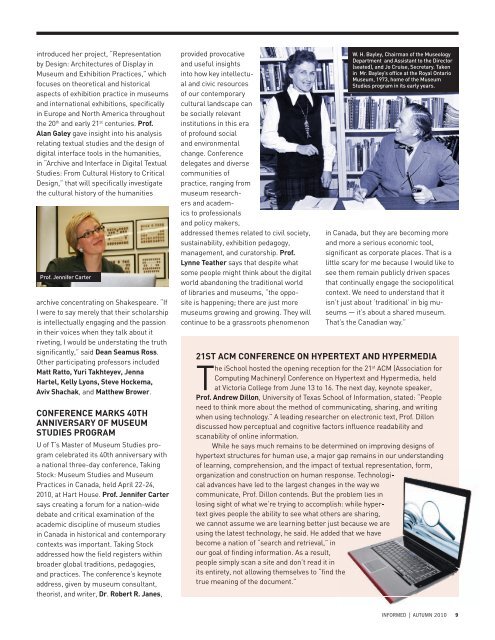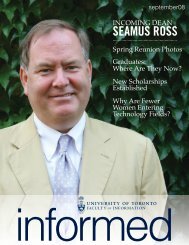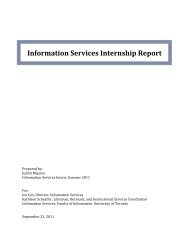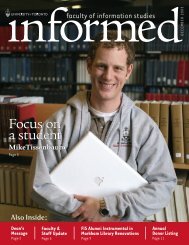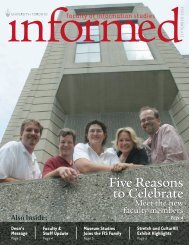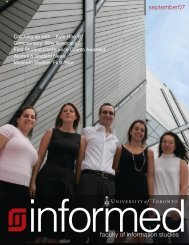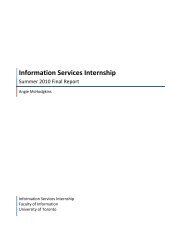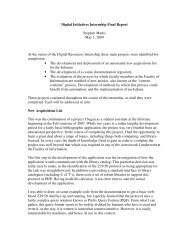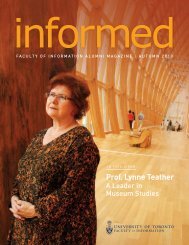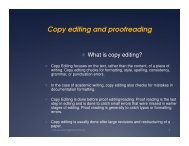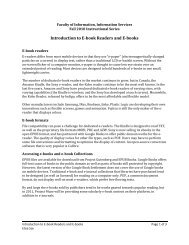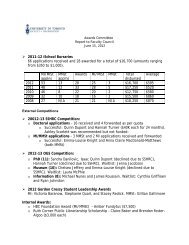Prof. Lynne Teather - Faculty of Information - University of Toronto
Prof. Lynne Teather - Faculty of Information - University of Toronto
Prof. Lynne Teather - Faculty of Information - University of Toronto
Create successful ePaper yourself
Turn your PDF publications into a flip-book with our unique Google optimized e-Paper software.
introduced her project, “Representation<br />
by Design: Architectures <strong>of</strong> Display in<br />
Museum and Exhibition Practices,” which<br />
focuses on theoretical and historical<br />
aspects <strong>of</strong> exhibition practice in museums<br />
and international exhibitions, specifically<br />
in Europe and North America throughout<br />
the 20 th and early 21 st centuries. <strong>Pr<strong>of</strong></strong>.<br />
Alan Galey gave insight into his analysis<br />
relating textual studies and the design <strong>of</strong><br />
digital interface tools in the humanities,<br />
in “Archive and Interface in Digital Textual<br />
Studies: From Cultural History to Critical<br />
Design,” that will specifically investigate<br />
the cultural history <strong>of</strong> the humanities<br />
<strong>Pr<strong>of</strong></strong>. Jennifer carter<br />
archive concentrating on Shakespeare. “If<br />
I were to say merely that their scholarship<br />
is intellectually engaging and the passion<br />
in their voices when they talk about it<br />
riveting, I would be understating the truth<br />
significantly,” said dean seamus ross.<br />
Other participating pr<strong>of</strong>essors included<br />
Matt ratto, yuri Takhteyev, Jenna<br />
Hartel, Kelly Lyons, steve Hockema,<br />
Aviv shachak, and Matthew Brower.<br />
coNFErENcE MArKs 40TH<br />
ANNiVErsAry oF MusEuM<br />
sTudiEs ProGrAM<br />
U <strong>of</strong> T’s Master <strong>of</strong> Museum Studies program<br />
celebrated its 40th anniversary with<br />
a national three-day conference, Taking<br />
Stock: Museum Studies and Museum<br />
Practices in Canada, held April 22-24,<br />
2010, at Hart House. <strong>Pr<strong>of</strong></strong>. Jennifer carter<br />
says creating a forum for a nation-wide<br />
debate and critical examination <strong>of</strong> the<br />
academic discipline <strong>of</strong> museum studies<br />
in Canada in historical and contemporary<br />
contexts was important. Taking Stock<br />
addressed how the field registers within<br />
broader global traditions, pedagogies,<br />
and practices. The conference’s keynote<br />
address, given by museum consultant,<br />
theorist, and writer, dr. robert r. Janes,<br />
provided provocative<br />
and useful insights<br />
into how key intellectual<br />
and civic resources<br />
<strong>of</strong> our contemporary<br />
cultural landscape can<br />
be socially relevant<br />
institutions in this era<br />
<strong>of</strong> pr<strong>of</strong>ound social<br />
and environmental<br />
change. Conference<br />
delegates and diverse<br />
communities <strong>of</strong><br />
practice, ranging from<br />
museum researchers<br />
and academics<br />
to pr<strong>of</strong>essionals<br />
and policy makers,<br />
addressed themes related to civil society,<br />
sustainability, exhibition pedagogy,<br />
management, and curatorship. <strong>Pr<strong>of</strong></strong>.<br />
<strong>Lynne</strong> <strong>Teather</strong> says that despite what<br />
some people might think about the digital<br />
world abandoning the traditional world<br />
<strong>of</strong> libraries and museums, “the opposite<br />
is happening; there are just more<br />
museums growing and growing. They will<br />
continue to be a grassroots phenomenon<br />
W. h. Bayley, chairman <strong>of</strong> the museology<br />
Department and assistant to the Director<br />
(seated), and Jo cruise, Secretary. taken<br />
in mr. Bayley’s <strong>of</strong>fice at the royal ontario<br />
museum, 1973, home <strong>of</strong> the museum<br />
Studies program in its early years.<br />
in Canada, but they are becoming more<br />
and more a serious economic tool,<br />
significant as corporate places. That is a<br />
little scary for me because I would like to<br />
see them remain publicly driven spaces<br />
that continually engage the sociopolitical<br />
context. We need to understand that it<br />
isn’t just about ‘traditional’ in big museums<br />
— it’s about a shared museum.<br />
That’s the Canadian way.”<br />
21sT AcM coNFErENcE oN HyPErTExT ANd HyPErMEdiA<br />
The iSchool hosted the opening reception for the 21 st ACM (Association for<br />
Computing Machinery) Conference on Hypertext and Hypermedia, held<br />
at victoria College from June 13 to 16. The next day, keynote speaker,<br />
<strong>Pr<strong>of</strong></strong>. Andrew dillon, <strong>University</strong> <strong>of</strong> Texas School <strong>of</strong> <strong>Information</strong>, stated: “People<br />
need to think more about the method <strong>of</strong> communicating, sharing, and writing<br />
when using technology.” A leading researcher on electronic text, <strong>Pr<strong>of</strong></strong>. Dillon<br />
discussed how perceptual and cognitive factors influence readability and<br />
scanability <strong>of</strong> online information.<br />
While he says much remains to be determined on improving designs <strong>of</strong><br />
hypertext structures for human use, a major gap remains in our understanding<br />
<strong>of</strong> learning, comprehension, and the impact <strong>of</strong> textual representation, form,<br />
organization and construction on human response. Technological<br />
advances have led to the largest changes in the way we<br />
communicate, <strong>Pr<strong>of</strong></strong>. Dillon contends. But the problem lies in<br />
losing sight <strong>of</strong> what we’re trying to accomplish: while hypertext<br />
gives people the ability to see what others are sharing,<br />
we cannot assume we are learning better just because we are<br />
using the latest technology, he said. He added that we have<br />
become a nation <strong>of</strong> “search and retrieval,” in<br />
our goal <strong>of</strong> finding information. As a result,<br />
people simply scan a site and don’t read it in<br />
its entirety, not allowing themselves to “find the<br />
true meaning <strong>of</strong> the document.”<br />
informed | autumn 2010 9


